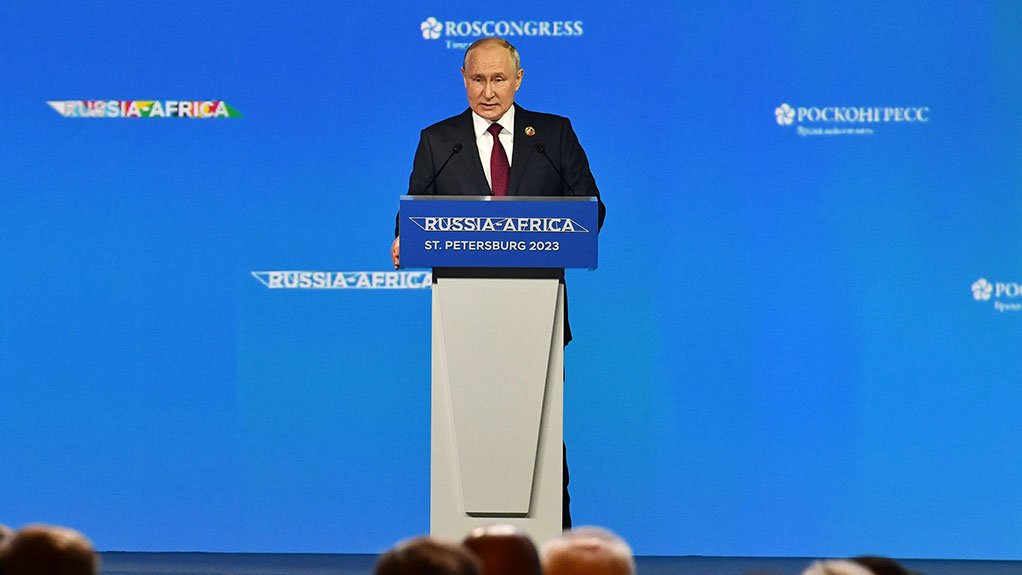African leaders pressed Russian President Vladimir Putin on Friday to move ahead with their peace plan to end the Ukraine war and to renew a deal on the export of Ukrainian grain that Moscow tore up last week.
While not directly critical of Russia, their interventions on the second day of a summit with Putin were more concerted and forceful than those that African countries have voiced until now.
They served as reminders to the Kremlin leader of the depth of African concern at the consequences of the war, especially rising food prices.
"This war must end. And it can only end on the basis of justice and reason," African Union Commission Chairperson Moussa Faki Mahamat told Putin and African leaders in St Petersburg.
"The disruptions of energy and grain supplies must end immediately. The grain deal must be extended for the benefit of all the peoples of the world, Africans in particular."
Reuters reported in June that the African plan floats a series of possible steps to defuse the conflict including a Russian troop pull-back, removal of Russian tactical nuclear weapons from Belarus, suspension of an International Criminal Court arrest warrant against Putin, and sanctions relief.
Putin gave it a polite but cool reception when African leaders presented it to him last month. On Friday he said Moscow respected the proposal and was carefully studying it.
Congo Republic President Denis Sassou Nguesso said the African initiative "deserves the closest attention, it mustn't be underestimated...We once again urgently call for the restoration of peace in Europe."
Senegal's President Macky Sall called for "a de-escalation to help create calm", while South African President Cyril Ramaphosa said he hoped that "constructive engagement and negotiation" could bring an end to the conflict.
The stream of calls prompted Putin repeatedly to defend Russia's position and place the blame on Ukraine and the West.
Responding to Mahamat, he said Russia was "grateful to our African friends for their attention to this problem" but it was Kyiv that was refusing to negotiate with him under a decree it passed shortly after he claimed last September to have annexed four Ukrainian regions that Russia partly controls.
'NEW REALITIES'
Russia has long said it is open to talks but that these must take account of the "new realities" on the ground.
Ukrainian President Volodymyr Zelenskiy has rejected the idea of a ceasefire now that would leave Russia in control of nearly a fifth of his country and give its forces time to regroup after 17 grinding months of war.
At the summit, Egyptian President Abdel Fattah al-Sisi urged Russia to revive the Black Sea grain deal which, until Moscow refused to renew it last week, had allowed Ukraine to export grain from its seaports despite the conflict.
Sisi, whose country is a big buyer of grain via the Black Sea route, told the summit it was "essential to reach agreement" on reviving the deal.
Putin responded by arguing, as he has in the past, that rising world food prices were a consequence of Western policy mistakes long predating the Ukraine war.
He has repeatedly said Russia quit the Black Sea agreement last week because it was not getting grain to the poorest countries and the West was not keeping its side of the bargain.
Since withdrawing from the deal, Russia has bombed Ukrainian ports and grain depots, prompting accusations from Ukraine and the West that it is using food as a weapon of war, and global grain prices have risen again.
On Thursday, he promised to deliver free Russian grain in the next several months to six of the countries attending the summit.
Putin is seeking to use the event to inject new momentum into Russia's ties with Africa and enlist the continent's support in countering what he describes as US hegemony and Western neo-colonialism.
Many of the African leaders had warm words for Moscow's record of support for their countries in their 20th century liberation struggles and more recently.
The leaders of Mali and Central African Republic, whose governments have relied heavily on the services of Russia's Wagner mercenary group, both expressed their gratitude to Putin.
CAR President Faustin Archange Touadera said his country's relations with Russia had helped it to save its democracy and avoid a civil war, thanking it "for helping us to oppose foreign hegemony".
Mali's Assimi Goita told Putin: "You have shown pragmatism and realism in efforts to reach agreement with Ukraine."
EMAIL THIS ARTICLE SAVE THIS ARTICLE
To subscribe email subscriptions@creamermedia.co.za or click here
To advertise email advertising@creamermedia.co.za or click here











